If you’re in Coventry and looking to learn chess, you’ve got options. But not all options are the same. Some teach you how pieces move. Others teach you how to think. The best ones do both — and they do it with a plan, with care, and with you in mind.
Online Chess Training
Landscape of Chess Training in Coventry and Why Online Chess Training is the Right Choice
Coventry has a quiet but rich chess culture. You’ll find clubs, casual tournaments, school teams, and a few private coaches working across the city. Some are passionate players. Some have been teaching for years. But very few follow a structured, modern, and personalized method of training.
Many students in Coventry start their chess journey in school chess clubs or local community centers. The coaching here is usually informal. It depends a lot on the person teaching. There’s no fixed syllabus. One week they teach openings. The next week it’s endgames. Then maybe some puzzles. It feels random. Students don’t always know what they’re supposed to focus on.
That’s why many students hit a plateau.
Now, compare that to an online chess academy. The best online academies offer:
- A step-by-step curriculum
- Classes grouped by level, not age
- Consistent practice material
- Live game reviews
- Weekly challenges
- Personal performance tracking
And most importantly — you can learn from home.
You don’t need to travel. You don’t miss classes because of weather. You don’t have to settle for the coach who happens to live nearby. You get the best of the world, not just the best in your neighborhood.
Online chess training isn’t just convenient. It’s smarter. It’s clearer. It’s more organized. And for parents — it’s more transparent. You can see what your child is learning. You can track progress. You can even watch recorded classes.
Offline training simply doesn’t offer this level of structure.
How Global School of Chess is the Best Choice When It Comes to Chess Training in Coventry
Now let’s talk about Global School of Chess. This academy isn’t just another online school. It’s the leader. And here’s why.
Global School of Chess doesn’t teach chess like it’s a game. It teaches it like it’s a skill. A life skill. Students don’t just learn how to win games — they learn how to think better, decide faster, and focus deeper.
What sets Global School of Chess apart?
Curriculum Built Like a Ladder
Every student begins with a clear level — beginner, intermediate, or advanced. There are levels within each level. Students move up only when they’re ready. Not when the class moves. That means no student feels lost. And no student gets bored.
Live Classes with Real Coaches
Each class is taught live. Not by a bot. Not by a recorded video. But by a real coach — one who has played in tournaments, trained students from around the world, and understands how to make the game simple, clear, and fun.
Class Sizes are Small
Most online classes elsewhere pack in 20 or more students. Global School of Chess keeps it small. That means every student gets attention. Every question gets answered. No one is invisible.
Progress Reports and Feedback
After every few classes, students get feedback. Not just “good job” but detailed, personal suggestions. What to improve. Where you’re doing well. What to work on next. These are shared with parents too.
Game Reviews and Strategy Workshops
Students play games every week. Then coaches review them — explaining mistakes, showing better moves, and teaching ideas that stick. This is how real growth happens.
Recorded Lessons and Flexible Timing
Missed a class? No problem. You get the full recording. Need to switch timing? Easy. You can request it. The focus is always on what works for the student.
National and International Tournaments
Students at Global School of Chess are encouraged to play in online and real-world tournaments. They get guidance on where to play, how to prepare, and how to learn from each game.
Affordable for Everyone
Despite all this, the pricing is transparent and fair. There are no hidden charges. No upsells. No complicated packages. Just one clear path: Learn well. Improve every week. And enjoy the game more and more.
Offline Chess Training
Let’s now look at how chess training happens offline — that is, in person.
This is how chess was taught for many years. A coach meets with a student, maybe at their home or at a club. The coach brings a board, maybe some notes, and they talk through some puzzles, games, and positions.
Some students do enjoy this. It can be friendly and relaxed. There’s face-to-face connection. But there are also serious problems that students often don’t realize right away.
There’s no fixed syllabus. One coach might jump from topic to topic based on what they like. Another might just watch the student play and give a few casual tips. It depends entirely on the coach’s own memory, energy, and experience.
Some don’t use digital tools at all. They may not record games. They may not analyze positions on a computer. And they might teach based on “what worked for them,” not what works best for the student in front of them.
Let’s say a student misses a session. There’s no recording to watch later. The class is gone. The learning is lost. And often — the fee is too.
This kind of offline learning also relies too much on availability. If the coach is sick, busy, or away — there’s no backup. If they’re not great at explaining things in a simple way — the student gets stuck.
And the biggest issue?
There’s no long-term tracking. No big-picture view. A student could attend lessons for months but have no idea how much they’ve actually improved. There are no level goals. No assessments. No feedback cycle.
All of this makes offline training more risky — and often, slower in delivering results.
Drawbacks of Offline Chess Training
Let’s look at this in plain terms. Here are the real problems most students face in offline coaching setups.
No Structure
There’s no path. Students often just learn “whatever comes next.” It’s not tailored to their level. So, they get confused or bored.
No Curriculum
A proper curriculum teaches things in the right order. It helps students build one skill at a time. Most offline coaching skips this. They teach puzzles one day and openings the next — without any connection.
No Feedback System
When you don’t know what you’re doing wrong, you repeat the same mistakes. Many offline students don’t even know their weaknesses. They just keep playing without improvement.
No Game Analysis
A big part of learning chess is reviewing your games. Knowing what you did right. What you missed. How to fix it. Offline coaches don’t always have the time — or the tools — to do this every week.

No Progress Tracking
How do you know if a student has improved? Is their rating going up? Are they solving harder puzzles? Are they beating stronger opponents? Offline setups rarely give parents — or students — this information.
No Flexibility
Let’s say your coach can’t meet on Saturdays anymore. Or your schedule changes. Offline coaching doesn’t adapt. You either adjust your life or stop your classes. That’s not a good system.
No Safety for Younger Students
Not every parent feels safe sending their child alone to a coach’s home. Or letting a coach visit theirs. In online training, students learn from the safety and comfort of their own space. Parents can even sit in on classes.
Best Chess Academies in Coventry
Now let’s explore the five best chess coaching academies in Coventry. These include both online and offline options, but we’ll show you why Global School of Chess remains the top choice for most students — not just in Coventry, but globally.
Let’s start with the number one.
Global School of Chess
This is the gold standard. And we’re not just saying that.
At Global School of Chess, the goal is simple: Teach chess in a way that students understand deeply and improve clearly — while enjoying every step of the way.
Let’s walk through what truly makes it better than every other chess academy in Coventry.
A Step-by-Step Curriculum That Actually Works
Every lesson at Global School of Chess follows a plan. Students don’t just sit and listen. They learn a new concept, try puzzles, ask questions, watch examples, and play games where they apply what they just learned.
Then they review it. Then they get feedback. Then they practice it again.
This loop of learn → apply → review → improve is the secret to real skill-building. And it’s done in every single class.
Coaches Who Teach with Clarity and Patience
All coaches here are not just strong players — they’re experienced teachers. That’s important. Because being good at chess doesn’t mean you’re good at teaching it. These coaches know how to make things simple, fun, and clear — even for young beginners.
They don’t rush. They don’t talk over students’ heads. They guide, step-by-step. And they really care.
Personal Attention in Every Session
Global School of Chess keeps class sizes small — often 4 to 6 students per group. That means your child isn’t just one in a crowd. Their voice is heard. Their games are seen. Their mistakes are corrected. And their strengths are built upon.
In one-on-one coaching, this gets even more focused. Lessons are customized entirely around the student’s current level, playing style, and goals.
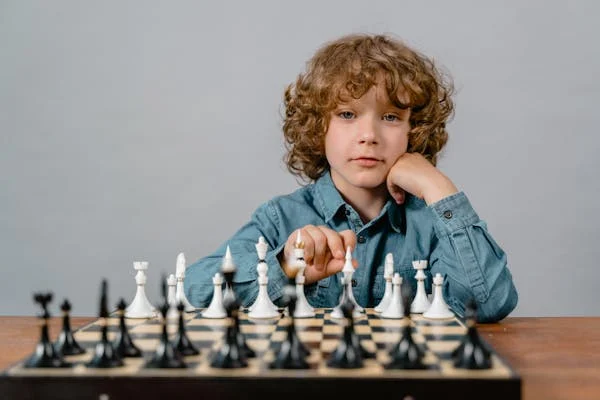
Game Reviews Every Week
This is a big one. Most students play games but never know what they did wrong. Or they keep guessing. At Global School of Chess, every student has their games reviewed regularly.
They see what they missed. They learn how to avoid that mistake again. They discover better moves. This is where true improvement happens.
Monthly Progress Reports
Every month, parents and students get a clear report. What was covered. What was learned. What’s next. This transparency builds trust and keeps everyone aligned.
Full Support — Inside and Outside the Class
Got a question between classes? Need help before a tournament? Need a game analyzed before Sunday’s big match? Support is available — not just during the lesson, but all week long. Students are never left alone.
Friendly Online Community
Students from all over the world learn at Global School of Chess. They make friends. They play games with classmates. They compete together. It builds confidence and connection.
And because it’s online, your location never holds you back. Whether you’re in Coventry or Cape Town, you learn from the same world-class system.
Tournaments and Leaderboards
Every few weeks, internal tournaments are held. Students love these. It gives them a safe, fun space to try new strategies, test their learning, and feel the thrill of competition. Rankings and certificates add to the fun — and the motivation.
Coventry Chess Club
Coventry Chess Club is one of the most well-known physical chess groups in the city. It has been around for many years and mainly serves adults and some juniors who are already active players. Most of their training happens through regular club meetings, team tournaments, and informal coaching sessions during games.
While the club is great for meeting other chess lovers and playing face-to-face, it’s not focused on structured teaching. There are no regular lesson plans. Beginners often find it hard to keep up, as most players are already experienced. There’s also no system of tracking progress or providing deep feedback after games.
Coventry Chess Club is excellent for casual over-the-board play, but not ideal for students looking for guided improvement. That’s where Global School of Chess is better — it offers structure, feedback, tracking, and full support for all levels of students, not just advanced ones.
Warwickshire Junior Chess
Warwickshire Junior Chess is a county-level initiative that encourages young players in Coventry and nearby areas to get into tournament chess. They run events, junior leagues, and occasional coaching days. Some strong players have come through this route.
However, their coaching is event-based. It’s not consistent. A student might attend a camp once in a while, but not have regular weekly lessons. Also, these group sessions often mix skill levels, so students either feel lost or unchallenged.
Warwickshire Junior Chess is good if you’re already playing competitively and want more game exposure. But for actual learning, it’s not enough. That’s why Global School of Chess stands out — it teaches regularly, tracks growth weekly, and adapts lessons to the individual student, every single time.
Chess in Schools and Communities (Coventry Branch)
This is part of a UK-wide program aimed at spreading chess to state schools. In Coventry, they run school clubs and teach basic chess during class hours or after school. It’s a wonderful introduction for very young kids who have never played before.
But the limitation is — it stays basic. There’s no way to grow beyond a beginner level unless a child finds additional coaching on their own. These school programs are not built for serious learners. There’s no syllabus beyond piece movement, tactics, and simple checkmates.
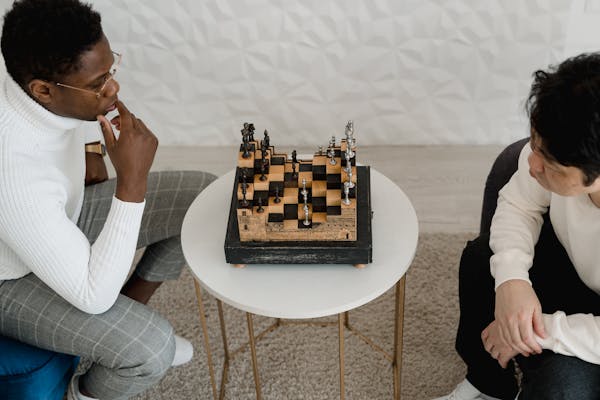
Global School of Chess, by contrast, helps students go from beginner to intermediate to tournament-ready — all within one platform. Parents don’t need to search for separate coaching after their child learns the basics. Everything is available in one place.
Local Private Tutors in Coventry
There are some independent chess coaches in Coventry who offer private, one-on-one lessons. Some meet at the student’s home. Some use cafes or community centers. Many are experienced players and have coached for years.
But here’s the challenge — it’s a solo effort. There’s no team of coaches. No shared platform. No standard method. Everything depends on that one person’s experience and availability. If the coach is sick or goes on holiday — lessons stop.
Also, some private tutors don’t use modern tools like digital boards, online databases, or puzzle trainers. And there’s usually no formal feedback for parents.
Global School of Chess doesn’t have these problems. It has a whole team. Every coach follows the same standard. Classes are scheduled, recorded, and reviewed. If one coach isn’t available, another steps in. Everything runs smoothly, no matter what.
Why Online Chess Training is the Future
Let’s take a moment to zoom out.
Why is the world of chess moving online?
Because it works better. It’s simple.
When you train online, you get:
- Flexibility to choose timing
- Coaches from anywhere in the world
- Tools to analyze your games instantly
- Access to class recordings
- A complete learning dashboard
- A global community of players at your level
Think of it like this: Would you go to a library once a week to read one book, or would you rather get access to every book in the world — anytime you want?
Online chess training is that second option. It gives more, teaches better, and adapts to your pace.
Offline coaching can’t compete. It might still exist, but it won’t lead. The future belongs to those who train smarter, not harder.
And Global School of Chess is at the front of this movement.
How Global School of Chess Leads the Online Chess Training Landscape
The rise of online education has disrupted nearly every industry — but few have adapted to it with as much precision and vision as Global School of Chess. While most chess academies treat online training as a temporary shift or a basic delivery mechanism, Global School of Chess treats it as a core strategy — a scalable, personalized, and deeply effective education model.
Let’s go deeper into how this academy is not just participating in the online chess wave — but defining it. And why their model is one that even other coaching-based businesses can learn from.
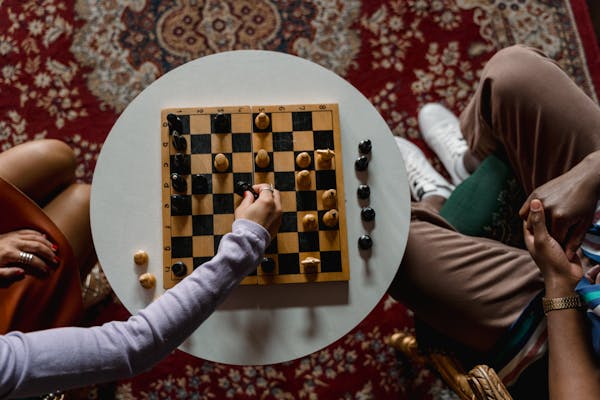
A Platform, Not Just a Program
What separates Global School of Chess from almost every other academy is that it behaves less like a coaching “class” and more like a SaaS-style platform with structured delivery.
Each student has a dashboard. Their progress isn’t measured in vague praise — it’s tracked in levels completed, accuracy improved, areas mastered. Parents can log in and see everything. Coaches can personalize faster. Students feel clarity and control.
This shift from “live teaching” to “platform-first learning” is the real game-changer.
Actionable Advice for Businesses:
If you’re building a learning business — in chess or beyond — don’t just focus on your curriculum. Focus on the delivery model. Ask: Does your system work like a guided journey with clear metrics and visual progress? Can users track their growth easily, without asking you? If not, you’re leaving engagement on the table.
Modular Curriculum = Scalable Personalization
Unlike typical academies that build content as one long course, Global School of Chess designs its curriculum in modular blocks. Each topic — say, knight forks, or double attacks, or king activity in endgames — is a building block that can be rearranged, expanded, or repeated depending on the student.
This makes the curriculum highly adaptive, while still being scalable. Whether it’s a 7-year-old beginner or a 40-year-old intermediate, the same core blocks are used — but personalized based on skill gaps, speed, and game behavior.
Strategic Takeaway for Education Startups:
Curriculum modularity is the secret to retaining users long-term. Design your content as stackable, trackable pieces. This allows flexibility without chaos. It lets you serve both mass cohorts and 1:1 clients from the same foundation.
Predictive Progression Using Data Signals
Most academies wait for students to hit a wall before adjusting their teaching. Global School of Chess does the opposite — it uses in-lesson performance, homework accuracy, and in-game behavior to predict when a student is ready to move up, or when they’re about to struggle.
This leads to more timely interventions. Students don’t feel “left behind,” and advanced learners don’t get bored. It’s a subtle form of learning intelligence, built into the backend.
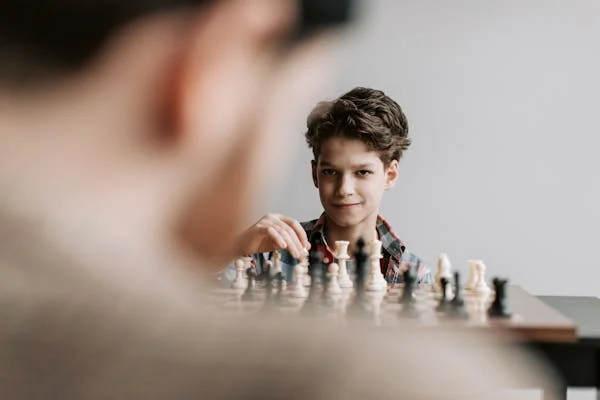
Actionable Tip for Digital Educators:
Your user data tells a story — not just of performance, but of confidence friction. Identify the moments when students hesitate, click away, or pause longest. Build your next lessons around those invisible blocks.
Community Without Chaos
Unlike noisy Discords or generic student forums, Global School of Chess builds small group communities by level — not by age or geography. These micro-communities grow together. They discuss positions, solve weekly challenges, and even compete in mini-tournaments.
This makes the learning feel social without becoming overwhelming. Students bond. But more importantly, they stay accountable.
Business Tip:
Don’t just add community as a “feature.” Curate it. Keep it level-based. Moderate it lightly. Give it purpose — like weekly puzzles or live discussion rooms. And make it optional, not noisy.
Learning Beyond the Zoom Window
For most chess academies, once the class ends, learning stops. At Global School of Chess, the lesson is just the starting point. Students are given assignments, post-lesson video reviews, reflection worksheets, and even “watch games” with coach commentary between sessions.
This builds habit formation, not just knowledge.
In chess — and in any form of skill-building — consistency matters more than intensity. Global School of Chess understands this at its core.
Copyable Strategy for Online Instructors:
Your class is a spark. But the fire is lit between sessions. Give students actionable micro-goals: one game to review, one tactic set to solve, one idea to try in play. Make it part of the system — not just an afterthought.
True Hybrid Enablement for Parents
One of the least-served audiences in most coaching systems? The parent.
Global School of Chess does something clever — it gives parents a lightweight, non-intrusive view into their child’s progress. They get:
- Monthly growth reports
- Clips of class highlights
- Notes on improvement areas
- Quick summaries of what was taught
This isn’t just a courtesy. It builds trust. It helps parents support learning better. And it reduces churn.
Growth Advice for Education Businesses:
Your secondary audience often decides the sale. Build features that make them feel seen, heard, and supported. Whether it’s a parent, HR manager, or team lead — their insight must be part of your system, not just your CRM.
A Culture of “Teach to Transform”
This is hard to quantify — but easy to feel. The best thing about Global School of Chess isn’t just its tech or design. It’s its teaching culture.
Every coach teaches with purpose. Not just to explain chess. But to help the student grow — in mindset, focus, calmness, and self-trust. That kind of culture doesn’t come from manuals. It comes from mission-driven hiring and mentor-driven coaching.
And it’s why Global School of Chess doesn’t just create better players — it builds better thinkers.
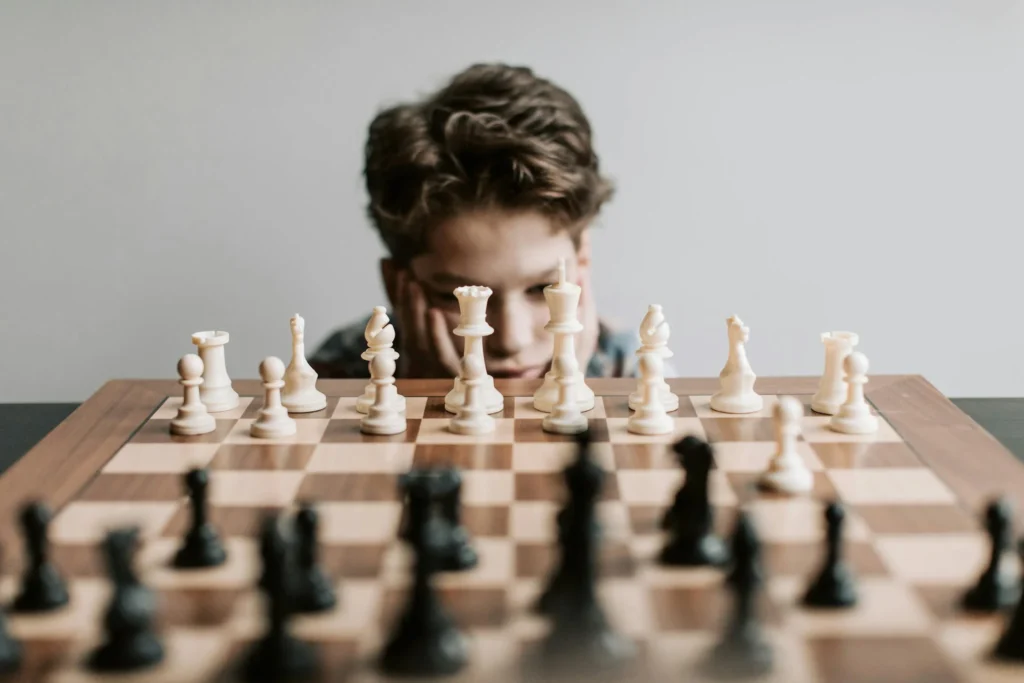
Cultural Insight for EdTech Founders:
Your teaching team is your product. Hire people who teach to transform, not just to explain. Reward clarity. Reward kindness. Reward curiosity. Your students will feel the difference.
Wrapping It Up
Chess is not just a game. It’s a way to grow — in focus, patience, decision-making, and confidence. But learning chess the right way matters. It can’t be left to chance. It can’t rely on guesswork. It must follow a clear path, guided by caring teachers and shaped by a smart system.

